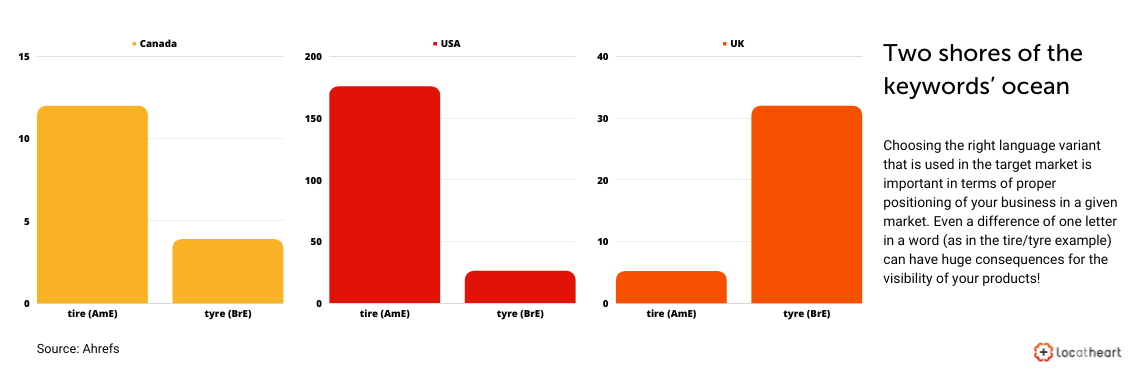British English or American English? We’ll help you decide which option is best for your business
A well-known philosopher and linguist Noam Chomsky said once that there is one human language, and we all speak dialects of it, which is why it’s hard for us to understand each other. Although it was a general observation, it’s particularly accurate when in comes to English.
There are a couple of main variants of this language, with British and American on top, divided further into accents and dialects that for speakers – supposedly of the very same language – unfamiliar with them can become a major communication hurdle.
If you’re wondering whether you should employ English of American version for building relationships with your clients – read on, and we will explain the main differences between these two, and help you make the right choice.
With this article, you’ll get to:
- Understand the difference between British and American variants of the English language.
- Read about another notable variant of it.
- Know that the differences between variants of the same language exist not only in English but in other languages as well.
- Find out who can help you choose the right language variant for your business.
Traditional and Simplified English – a hurtful stereotype vs reality

The presumption that the American variant of the English language is some sort of ‘simplified’ version of British English is a hurtful and in itself simplified notion completely at odds with the evolution of both these alternatives throughout the years.
Perhaps the responsibility for creating this stereotype – according to which British English and American English lie on the opposite ends of the spectrum, and that includes the cultural values associated with them – lies with… Hollywood..
Just look at the way language variants and different accents are used to present, often in an exaggerated manner, qualities of the on-screen persons, and to evaluate them.
When you’re watching a film, whether at the leisure of your home or at the cinema, and suddenly a cowboy appears, riding through the Great American Plains, their formulaic laid-back way of being is always accompanied by an American accent. Similarly, in the case of a more posh-based role, we often might hear the more (or so we are led to believe) refined British English.
From a linguistic standpoint, both British and American accents are quite similar, at least when it comes to a formal, standardised style. The differences come to the foreground when it comes to colloquial language. By this virtue alone, proclaiming that one of the two is in any way more or less prestigious than the other is unfounded (and frankly doesn’t make sense).
Business-wise, it all depends on the brand image you are trying to build, and on the way you want the customers of a given market to react to it. Choosing the right language variant is the decisive factor when it comes to achieving the desired effect.
British English, American English… What about Canadian English and other variations?
Canadian English is an interesting case. Due to specific historical factors and political-legislative ties between Canada and the United Kingdom on one hand, and close proximity of the United States on the other, an intriguing amalgam emerged, which combines in a very egalitarian manner variants from both sides of the pond.
Canadian economy is an entirely different matter of potentially great importance for the e-commerce industry and effected both by British and American influences.
For example, within the automotive industry of Canada, typical American words are used, as it was much easier to import cars and car parts by land from the southern neighbour than from beyond the Ocean. And along with the products, terminology was also imported, which has led to ousting the British elements from the lexicon in the land of the maple syrup.
Legal and financial language underwent transformations of a different kind – here, because of political considerations, trade agreements and currency links (up to this day, Canadian banknotes feature the image of the current reigning British sovereign), the position of the British variant remains uncontested.
When you decide to expand to foreign markets, it’s always worth getting the help of linguists who are not only well-versed in a given language, but also use the specific variant of it, spoken in the part of the world you are interested in.
This will ensure that your content will sound very natural to the audience of the country of your choice, which in turn will undoubtedly help with creating a positive image for you brand.

Language variants are not an exclusive domain of the English language!
Visible differences between variants of the same language used in different countries are not limited to English! A similar situation might be observed in the case of German, used in Germany, Austria and Switzerland. A direct comparison is featured in this video:
The scale of disparity between German used in Germany and its Austrian counterpart might come as a shock, even more so as these are in fact two adjoined countries that share common culture and history. It seems that Karl Kraus was right when he said that, ‘What distinguishes the Germans from the Austrians is their common language.’
Things get even more complicated when we take a closer look at Spanish. In this case – not unlike in English – variability depends not only on regions or countries but even on the continent we’re standing on, which is the reason why there are so many Latino-American variants of this language.
Moving through the land of Latin America, one encounters many local variants of Spanish. In almost every country where Spanish is used, familiar elements of the lexicon are augmented by regionally-based variants of each word. Some grammar rules can also become remodelled.
There can be only one conclusion to this – when selecting a variant of a language for your commission, not only the language itself is important, but also the target country where the content is to be published in.
Just like in the case of English, certain versions of German or Spanish might have significant impact on the way your brand is seen in a particular part of the world.
Here’s some food for your thought (courtesy of the film industry and Arnold Schwarzenegger). Schwarzenegger was denied the chance of providing voice for the titular character in The Terminator when German dubbing was recorded. The reason for this was that in the mind of an average German filmgoer the strong Austrian accent of this muscular action actor would connote an image of a not-that-sharp-witted peasant rather than a killer cyborg.
A similarly negative effect can be achieved if you fail to select the appropriate language variant for the localised content, and it will not fit to the reality of a given target market.
Suit and tie or a baseball hat? Language variant vs language register
Now you know that the language variant used in the localisation of content created by your company is of considerable importance for creating brand image on a relevant foreign market.
Another thing you have to take into account is the language register. Should you opt for a more serious tone or rather shorten the distance between you and your audience? A YouTube video linked above illustrates the difference between two English phrases with – as one could imagine, especially if they are not a native speaker – the very same meaning:
Both expressions could be rendered into Polish as serdeczne powitanie.
However, any native speaker asked to describe the event evoked by each of those phrases, the people partaking in it and the feelings surrounding it, will paint two different pictures.
In the first case (‘hearty welcome’) you get a wholesome, warm, family greeting. The second phrase (‘cordial reception’) brings to mind a situation where a guest is received in a more formal manner, perhaps on a business occasion, and the surrounding atmosphere is decidedly colder.
The difference stems from the way the English language has evolved, but that’s not the main issue here. From your and your business’ perspective, the major point of consideration is that differences like these, so subtle and yet so significant, require a great deal of awareness of the way a given language works, picking up the minute details on the level beyond the capabilities of a non-native speaker. At this point, it’s not enough to understand the phrases correctly, you have to be savvy enough and use the language daily, so it comes to you naturally – you have to be immersed in the culture that stems from this language.
That’s why at LOC AT HEART we always commission translations to linguists who translate from the source language (usually English) to their native language – it’s the only way we can guarantee the highest possible quality of the delivered text.
Having troubles with picking the right language variant for your business? Let the experts at LOC AT HEART handle it!
Choosing the right variant and register of a language to suit your brand strategy requires linguistic awareness of the highest level.
Thanks to the extensive knowledge of the specialists at LOC AT HEART, you might rest assured that the voice of you brand will echo through every market in a way you have devised for it, and your content marketing endeavours will generate expected outcomes, which will help you win over more clients and increase the profits of your company.
Contact us, and our experts will help you select the right language variants for your brand.
British English and American English – FAQ
Short answer – it most certainly is! And it’s not just about the contrasting lexical resources or grammar rules, but also about divergence in the reception of a given version on a particular market. Using American English for UK markets will result in quite a different outcome when it comes to brand image than when using British English for US markets.
Sources
The Editors of Encyclopaedia Britannica. (n.d.). What did Shakespeare sound like? Encyclopædia Britannica. Retrieved December 21, 2022, from https://www.britannica.com/story/what-did-shakespeare-sound-like.
Macquarie University. (n.d.). Australian English defined. Retrieved December 21, 2022, from https://www.mq.edu.au/research/research-centres-groups-and-facilities/healthy-people/centres/centre-for-language-sciences-clas/australian-voices/australian-english-defined.
Marian, J. (n.d.). Is American English ‘simplified’ and British English ‘traditional’? Jakub Marian’s Educational Blog. Retrieved December 21, 2022, from https://jakubmarian.com/is-american-english-simplified-and-british-english-traditional/.
Ro, C. (2018, February 8). How Americans preserved British English. BBC. Retrieved December 21, 2022, from https://www.bbc.com/culture/article/20180207-how-americans-preserved-british-english.
Wikipedia. (2022, December 15). Australian English. Retrieved December 21, 2022, from https://en.wikipedia.org/wiki/Australian_English.






Leave a Reply